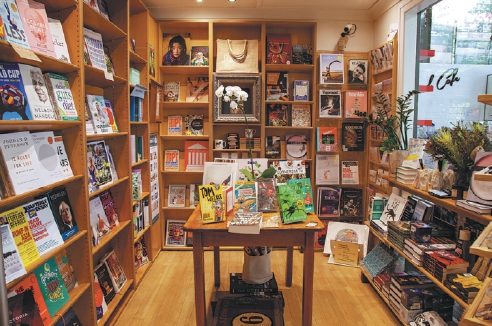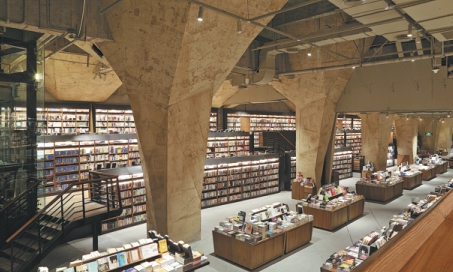Turning pages
 0 Comment(s)
0 Comment(s) Print
Print E-mail China Daily, November 15, 2019
E-mail China Daily, November 15, 2019

Bookstore owners from China and abroad discuss how best to curate books at a forum in Chengdu, Li Yingxue reports.
Melanie O'Brian, the curator of the Power Plant Contemporary Art Gallery in Toronto, Canada, once clearly defined the shared border between curating and editing.
"The language of curating is comparable to that of editing. The shared activities of selecting, assembling, arranging and overseeing ideas bring the two roles into close alignment. As editors of ideas, curators bring forward art and cultural practices to make the ideas available to the audience, not only through exhibitions, but publications, websites, forums and other events," she says.
Themed "the era of curation", the Chengdu International Bookstore Forum 2019 was held over Nov 1-3 in Chengdu, Sichuan province. It is an intellectual quest into bookstores, art museums, public cultural spaces and even citywide cultural life to examine how their "curatorial mindset" is engaged in heightening creativity, linking up works, authors, institutions and the public.
"Knowing all too well that readership is the lifeblood of publishing and bookstores, we take it as the common mission of the entire book industry to keep close tabs on reading, and perennially promoting a nation of readers," Mao Jihong, president of the Fang Suo Commune and founder and president of Mao Jihong Art Foundation, said at the opening ceremony of the forum.
The ability to curate has moved beyond curators of museums or art galleries.
"In our time, it has become a language, the communicative competence of necessity for all," Mao says. "Like handpicking the appropriate diction, you have to select and process various materials, put them together to send your message, form your imagery and voice your stand, leaving viewers with an impression that lasts."
He adds that in a bookstore setting, daily deeds-from selecting and displaying recommended books to designing posters and organizing exhibitions, in the fashion of small creative bursts-transform the space into an edited medium, or an "unending flow of curating", where customers receive the message it sends and identify the unique style it holds.

"Curation can do more, even to the extent of reinventing a city," Mao says.
He cites the success of Echigo-Tsumari Art Triennial, a land art festival that put the remote Japanese region on the international cultural map thanks to curation.
Mao invited representatives of six bookstores from France, Britain, Australia, New Zealand and the United Arab Emirates to bring their insights to the forum.
Suzanne Wilson, owner of Riverbend Books, an independent Australian bookstore in Bulimba, Queensland, shared her experience and insights into the curating power of a bookstore.
She founded Riverbend in 1998 on the corner of Oxford and Cambridge streets, and the store's name harks back to the early days when indigenous Australians called the area Tugulawah, or "river bend". She says she values the local community and has built up a dozen book clubs that regularly bring readers together at her bookstore. Members of her staff draw up recommended reading lists by genre, and she also posts book reviews by readers.
Wilson was the recipient of the Lloyd O'Neil award in recognition of her contribution to the Australian book industry and was inducted into the Australian Book Industry Hall of Fame in 2018.
She says curation has always been part of how to run a bookstore.
Wilson says she likes the theme of the conference. "It speaks to a general movement toward more thoughtfulness, to thinking a bit more that we are not just retailers who put books in front of people," she says. "It really encourages us all to think what can we do to create good places."
Liao Mei-li, co-founder of the Fang Suo Commune, says in Western bookstores customers enjoy pure reading more, while in Asia, bookstores are rapidly turning into public spaces for customers.
"But I think all of us who have been working in the bookstore industry for years, are thinking about how to defend the key part of books so that they won't be squeezed too much by other business in the bookstore," says Liao.
Liao says the importance of curation for bookstores has increased partly because art and design are becoming a bigger part of people's daily lives with the rise of cultural and creative industries in China. She divides bookstore curation into three steps.
First, curate each bookshelf with certain themes, posters or recommended books. "We can put recipe books for a single person and economic books for a single economy on one shelf."
Second, use the whole space for curating with certain themes, she says. And third, get out of the place to hold related events such as forums or concerts.
"The specialty of the book industry is that it can do crossovers with other areas because books can cover all fields," Liao adds.
Nicolas Barley, director of the Edinburgh International Book Festival shared his ideas on how a cultural event can be turned into a city's trademark by connecting institutions, creators and participants.






Go to Forum >>0 Comment(s)